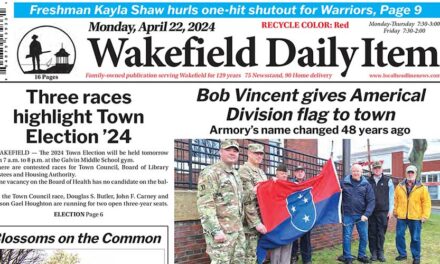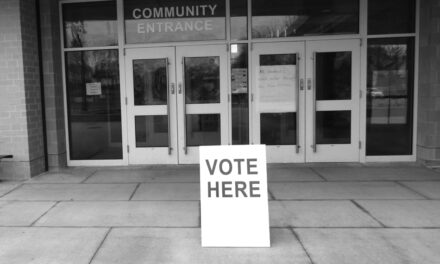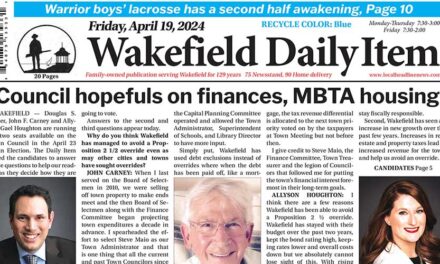Published in the April 4, 2018 edition
By MARK SARDELLA
WAKEFIELD – The four candidates vying for two seats on the Board of Selectmen fielded questions from the local press during a televised debate last week at the WCAT cable studio. Challengers Deborah Butler and Julie Smith-Galvin along with incumbent selectmen Paul DiNocco and Brian Falvey weighed in on centralized voting, making the name of the board gender neutral, the current level of development in Wakefield and a host of other issues during the hour-long forum.
Butler expressed a level of skepticism for moving away from neighborhood polling places to centralized voting at the Galvin Middle School. Absent a fiscal benefit to centralized voting, she suggested that it could stay in the neighborhoods. She also pointed to the cost to Galvin parents, who will have to find child care as the school will be closed on election days.
DiNocco indicated that it made logical sense to him to go to centralized voting once the Galvin became available. He said that he had heard both sides of the issue and suggested trying it out. He said that it could always be changed if necessary.
Smith-Galvin said that she saw a lot of benefits to centralized voting. She said that it would solve the problem of people not knowing what precinct they’re in or where to vote. She added that the Galvin is a public building on public transit lines. She acknowledged that “change is hard,” but favored doing it on a trial basis to see how it works.
Falvey saw it as a question of whether the town was disenfranchising voters. He said that if even one voter objected to voting in a church or a venue like the Masonic Building, it had to be changed.
All candidates said that they favored changing the name of the Board of Selectmen to the gender neutral “Town Council.”
“I think it’s the right thing to do at this point in time,” DiNocco said.
Smith-Galvin also favored the change. “Let’s just do it and move on,” she urged.
Falvey said that if the word “selectman” made anyone feel uncomfortable it had to be changed. “It’s the small biases that we need to eliminate,” he said.
Butler also agreed with the change, but with mixed feelings. She said that she would have enjoyed being able to walk into a room as a selectman. “For me, it’s very exciting to be running for Board of Selectmen,” she said.
Asked if Wakefield was becoming overdeveloped, Butler said that the town “may be hitting the beginning of a tipping point.” She said that bringing in large numbers of new people at once can strain services, including schools. She pointed to the town of Reading which she said was being “hit hard by multi-unit development.” Butler said that she was “concerned without being an alarmist.”
DiNocco said that he felt that the town made the right decision in encouraging mixed-use development in the downtown area. He said that such projects were not a detriment to the town and provided tax revenue. She said that reports indicate that they do not have a great impact on schools.
Smith-Galvin said that mixed-use developments add vibrancy to the downtown. “We need housing options,” she noted, adding that focusing development on the downtown helps businesses and commuters.
Falvey pointed out that large 40B rental projects like the one proposed at Tarrant Lane will help Wakefield get to the 10 percent affordable housing threshold at which point the town would have more control over future 40B proposals. He called mixed-use developments “vital to our downtown.”
With Police Chief Rick Smith expected to retire in the next few years, the candidates were asked what qualities they would look for in a new police chief.
Falvey said that Chief Smith had set the bar very high for his successor but had at the same time made the job easier by leaving a well-trained, well organized department. He said that he would look for the same qualities in a new police chief that Smith brings: visibility, good communications skills and a leader that people want to work for.
Butler agreed. She called Smith a “visionary” who stays on top of law enforcement and cultural trends. “What I would want in a new police chief is him,” she said. “He’s been great for the Police Department and great for the town.”
DiNocco said that Chief Smith’s leadership team has been molded in his qualities. He said that Smith has made a name for Wakefield across the country. “We will have a hard choice when the time comes,” DiNocco said.
Smith-Galvin agreed that Chief Smith “has built an amazing bench” in the officers of the WPD. She said that in a new chief she would want someone who is community-minded with respect to both minority and majority communities. She said that she would want someone who, like Smith, is engaged with the community.
The debate was moderated by Bill Carroll and produced for WCAT by David Watts, Jr.




